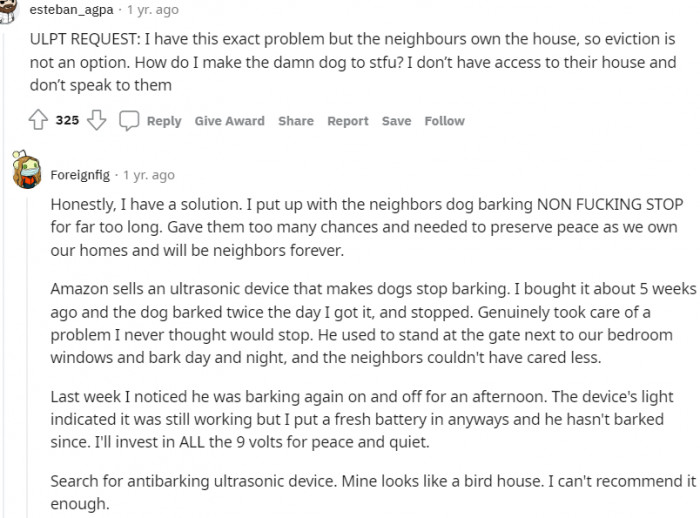Redditor Gets Revenge By Using Dog Whistle To Induce Dog Barking So As To Wake Owners At Midnight
Are you sure you want to be that neighbor? You know, the one with the consistently barking dog who makes the neighbors "frenemies"?
Your dog has one job, which is to defend her territory, so if your dog is pestering your neighbors and barking nonstop, it's probably for a "good" reason. It's not because your dog despises the neighbors that they bark at them.
Actually, the barking isn't always a terrible thing. Dogs have hearing abilities beyond our own, and we want a companion.
We also want a protector, which is why some of us get dogs. But what happens when the neighbors are so irritated by your dog's barking that they find a way to get even with you?
Well, the redditor in today’s post got revenge on a neighbor whose dog "barks like crazy." Read all about the inspiring moment below.
Get them kicked out of the complex all together

There were multiple complaints about them and their dog

Many redditors were hilarious in their replies and dropped comments in their hundreds. The reddit post got upvoted 14K times with 15 awards.
We’ve gathered some of their best replies for you below, so go ahead and enjoy!
1. This is a case of classical conditioning

Understanding Dog Behavior
Dogs communicate through barking, an instinctive behavior rooted in their evolutionary background as pack animals. According to a study published in the journal Animal Behavior, barking serves multiple functions, including alerting the pack of potential threats and facilitating social interactions. This instinctive behavior can often clash with urban living, where noise complaints escalate tensions between neighbors. Understanding this context can help mitigate frustrations; instead of viewing barking as a nuisance, it can be reframed as a dog’s natural instinct to communicate and protect its territory.
Moreover, Dr. John Bradshaw, a leading animal behaviorist, emphasizes that addressing a dog's barking requires understanding its triggers. This insight allows owners to implement training techniques that reinforce desirable behaviors, creating a more harmonious living situation.
The Psychology of Annoyance
Living in close quarters with others can lead to conflicts, especially when it comes to noise levels. Noise annoyance is a common psychological phenomenon that can have significant impacts on well-being.
Research published in the Journal of Environmental Psychology indicates that excessive noise can lead to stress and irritability, affecting interpersonal relationships.
2. They need an egg in this trying time

3. Every time the parents argued

4. Does this Redditor mean getting a rooster or what?

The phenomenon of retaliatory behavior, such as using a dog whistle to provoke barking, is deeply rooted in psychological principles of conflict and aggression. Research into social psychology indicates that perceived injustices can lead to cycles of retaliation, where one act of aggression begets another. A study published in the Journal of Conflict Resolution found that when individuals feel victimized, their likelihood of responding with counter-aggression increases significantly.
This retaliatory behavior can escalate conflicts within apartment complexes, creating an environment of hostility. Understanding this dynamic can be beneficial for residents; it emphasizes the need for communication and conflict resolution strategies rather than escalating tensions through indirect actions.
The use of a dog whistle to induce barking reflects a desire for retaliatory behavior, which is often rooted in feelings of frustration. Psychologists explain that such behaviors can be seen as a means of regaining control in an uncontrollable situation.
According to a study from the University of Michigan, individuals often resort to passive-aggressive behaviors when they feel powerless to address conflicts directly.
5. This Redditor wants to know how to go about this problem

6. It is likely this is explicitly banned

7. The other tenants have been blowing dig whistles all the time

Effective Communication Strategies
Behavioral psychologists advocate for open communication as a fundamental approach to resolving neighborhood disputes. According to research by the American Psychological Association, effective communication strategies can significantly reduce misunderstandings and foster cooperative relationships among neighbors. One effective strategy is to engage in active listening, where each party feels heard and valued. This can be particularly important in residential settings where diverse lifestyles and habits lead to friction.
To implement this, residents could organize informal gatherings, creating opportunities for dialogue about issues like noise and pet behaviors. Studies show that building rapport through casual conversations can lead to more amicable resolutions when conflicts arise.
The Impact of Noise on Mental Health
Excessive noise not only causes annoyance but can also lead to long-term mental health issues. Studies suggest that chronic exposure to noise pollution can contribute to anxiety and depression.
Research from the World Health Organization highlights the importance of addressing noise pollution as a public health concern, advocating for environments that promote well-being.
8. He is already doing the work himself

9. Do hamsters really bite?

10. People abusing the loopholes to get emotional support animals

The use of a dog whistle may point to deeper social dynamics within shared living spaces. Research in social psychology indicates that living in close quarters can lead to heightened stress and irritability among residents, often resulting in conflicts over minor issues. A study from the Journal of Environmental Psychology highlights that densely populated areas can amplify perceptions of noise and disturbance, leading to decreased life satisfaction and increased tension among residents.
Recognizing these environmental stressors is crucial. For example, residents may benefit from mindfulness practices that enhance emotional regulation and reduce responses to perceived provocations, fostering a more peaceful coexistence.
In this context, the use of a dog whistle can exacerbate the problem rather than provide a lasting solution. While it may offer temporary relief, it can also lead to increased tension between neighbors and further conflicts in the future.
Instead of resorting to these means, individuals are encouraged to seek constructive communication strategies to address their concerns.
11. This is a pretty tricky situation

12. Dogs are allowed to bark during the day

13. Sounds like you are the cause

The Role of Empathy in Conflict Resolution
Empathy plays a significant role in resolving conflicts, especially in community settings. Research conducted by Dr. Simon Baron-Cohen at the University of Cambridge highlights that empathetic understanding can reduce aggressive tendencies and promote cooperative resolutions. When individuals put themselves in another's shoes, they are less likely to engage in retaliatory behaviors and more likely to seek constructive solutions.
In situations like the one described, where one neighbor's actions disturb another, practicing empathy can lead to more effective communication and cooperation. This can involve discussing the issue openly with the dog owner, expressing concerns in a non-confrontational manner, and seeking mutually beneficial solutions, such as dog training or designated quiet hours.
Understanding the Bystander Effect
The bystander effect can complicate interpersonal conflicts, especially in shared living environments. Research indicates that individuals may feel less inclined to act in situations where they believe others are present to intervene.
A study published in the Journal of Social Psychology highlights how diffusion of responsibility can lead to inaction, resulting in unresolved conflicts.
14. Stop enabling bad dogs and bad dog owners

15. What this Redditor is advising the OP to do

16. Why do you find pleasure in harassing a scared dog?

From a behavioral perspective, the actions of the dog owner can also be contextualized within reinforcement theory. According to B.F. Skinner's principles of operant conditioning, behaviors that lead to desirable outcomes are more likely to be repeated. If the dog’s barking results in the owner receiving attention or a reaction from neighbors, this could inadvertently reinforce the barking behavior. Understanding this can lead to more effective training strategies that focus on rewarding quiet behavior instead of punishing barking.
Implementing positive reinforcement techniques, such as rewarding the dog for remaining quiet during specific times, can effectively reduce excessive barking. This approach not only benefits the dog but also enhances the overall living environment.
In this case, the individual using the dog whistle may feel emboldened by the belief that they are not alone in their frustrations. Understanding the psychological mechanisms behind the bystander effect can help individuals recognize the importance of personal accountability and direct communication.
17. That is the problem with apartments

18. Putting up with someone's dog who isn't trained

19. A neighbor lets her seven cats roam

Creating a Harmonious Living Environment
Creating a peaceful living environment in shared spaces requires proactive measures. According to research published in the Journal of Community Psychology, community engagement initiatives can foster better relationships among residents, reducing conflicts over issues like noise and pet behavior. Simple strategies such as neighborhood meetings or community pet training sessions can build rapport and understanding among residents.
Such initiatives have been shown to create a sense of belonging and reduce feelings of isolation, which can alleviate some of the tensions associated with communal living. Residents are encouraged to take the initiative in reaching out and collaborating on community-building projects that promote harmony and understanding.
Promoting Healthy Communication
Effective communication is crucial in resolving conflicts, especially in communal living situations. Research indicates that using 'I' statements and expressing feelings can help reduce defensiveness and encourage open dialogue.
According to communication experts, active listening is also essential in promoting understanding and resolving misunderstandings.
20. This Redditor is suggesting a better title

We can’t choose who becomes our neighbor, but we can definitely do something about a bad one. This Redditor went to the extreme just to make their neighbor as uncomfortable as their dogs made them.
What do you think about the OP’s action? Would you act the same way or handle it in another way?
Drop all of your replies below.
Instead of resorting to retaliatory measures, individuals are encouraged to approach their neighbors with open communication. Seeking to understand their perspective can create a collaborative atmosphere that fosters resolution rather than escalation.
Creating a culture of respect and understanding is vital for maintaining positive relationships in shared living environments.
The Role of Empathy in Conflict Resolution
Empathy plays a crucial role in navigating interpersonal conflicts. Research suggests that when individuals take the time to understand each other's perspectives, it can lead to more effective resolutions.
A study from Stanford University found that empathy can reduce hostility and promote cooperation, which are essential for resolving conflicts amicably.
Encouraging individuals to practice empathy can help foster stronger relationships within a community. By recognizing and validating each other’s feelings, individuals can work towards finding solutions that benefit all parties involved.
Ultimately, prioritizing empathy in communication can lead to more harmonious living situations.
Psychological Analysis
This situation underscores the importance of communication in resolving conflicts. Recognizing the psychological factors at play can guide individuals toward more constructive solutions that promote harmony in shared living environments.
Analysis generated by AI
Analysis & Alternative Approaches
In conclusion, addressing conflicts in shared living environments requires an understanding of psychological dynamics and effective communication strategies. Research supports the idea that empathy and open dialogue can significantly improve interpersonal relationships.
By fostering a culture of respect and understanding, individuals can navigate conflicts more effectively, enhancing their overall quality of life.
Therapeutic Insights & Recovery
Behavioral specialists emphasize that the dynamics of living in close quarters can often lead to misunderstandings and conflicts, especially regarding noise issues such as barking dogs. Research consistently shows that fostering communication, empathy, and understanding can significantly improve relationships among neighbors. It’s crucial for residents to recognize the impact of their actions and to seek constructive solutions rather than retaliatory behaviors.
Ultimately, creating a harmonious living environment is about mutual respect and collaboration, where all parties can thrive while respecting each other's needs and boundaries. This approach not only enhances individual well-being but also contributes to a more supportive community dynamic.



